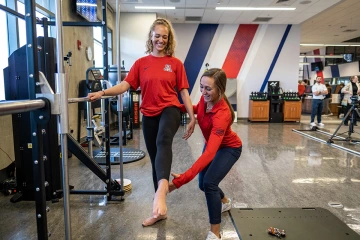Physical Therapy Curriculum

The Doctor of Physical Therapy curriculum at the University of Arizona is designed to provide our future scholarly clinicians with a strong and comprehensive background in exercise prescription, movement sciences, and rehabilitation to masterfully serve our surrounding community.
109 credits are required for graduation.
Year 1

This first module in the Doctor of Physical Therapy program introduces students to the critical building blocks related to the practice of Physical Therapy. The student will develop foundational knowledge in the basic sciences including anatomy, pathology, physiology, biomechanics, pharmacy, and kinesiology. The student will also start learning those personal attributes that are key components to being a skilled PT and a master adaptive learner. These skills include communication, ethics, critical thinking, clinical reasoning, emotional intelligence, and awareness of social determinants of health. Students will also start work on their clinical Spanish language skills.
In the acute care setting a skilled Physical Therapist must be able to respond and react to fast moving situations. In this module students will learn skills specific to the acute care setting including moving and transferring patients, correctly interpreting vital signs, contra-indications to treatment and being aware of patient precautions. The student will develop their knowledge of the core sciences specific to this setting and with emphasis on the cardiovascular system. The student will be introduced to diagnostic imaging, pharmacy, nutrition, and medical conditions across the lifespan typically found in the acute care setting. Throughout the module students will continue to develop their personal skills and to practice their Spanish language skills.
In the rural and community setting the Physical Therapist will engage the patient in different locations including their home, day centers, schools, and local clinics. In this module the student will focus on the issues found in rural and community settings, specifically the social determinants of health and cultural influences and how they affect an individual’s wellbeing across the lifespan. Screening experiences, community events and health informatics will assist the learning process. Students will continue to progress their core science skills, developing their knowledge of typical conditions across the lifespan with emphasis on pediatrics and the older adult while further developing their personal skills.
In the first full time clinical, students will experience the acute care setting. In this full time integrated clinical experience students will develop their abilities to effectively communicate with their patients and professional peers from all disciplines. The student will develop competence in basic aspects of patient treatment including patient handling skills, response to treatment, correct interpretation of vital signs, precautions, complications, and documentation.
Year 2
In the subacute and rehabilitation setting the Physical Therapist works with individuals after their initial medical stabilization from an accident, event, or medical exacerbation. In this module the focus is on teaching skills needed to enable the patient to participate in their personal goals. The student will learn handling skills and techniques suitable for patients with neurological conditions and major traumatic events across the lifespan. This includes CVA, TBI, SCI and multi trauma including amputation. Students will work on documentation, discharge planning and successfully transitioning the patient to the next setting. Students will develop skills and knowledge regarding durable medical equipment, prosthetics and orthotics and assistive technology for individuals across the lifespan. Students will continue to improve their personal skills as they strive to become the master adaptive learner and skilled physical therapist.
In the second full time integrated clinical experience students will develop their patient handling skills, communication, and clinical reasoning. A critical aspect of the rehabilitation setting is teamwork and students will work alongside other disciplines as well as appropriately delegate to the Physical Therapist Assistant and other support personnel.
Musculoskeletal conditions are typically seen by the Physical Therapist in the outpatient setting. In this module students will demonstrate mastery of their anatomical knowledge, and analyze the pathology, physiology, biomechanics, genetic, and environmental influences on the musculoskeletal system. Students will use diagnostic imaging and modalities to assist in their treatments and will learn the manual skills for interventions including key areas of acute and chronic pain. Students will also develop the skills and knowledge to work with patients with vestibular, lymphatic, and pelvic health conditions, all of which are part of the outpatient setting. Students will further develop their skills for patients across the lifespan with conditions that have transitioned through the acute and rehabilitation settings. Students will continue to focus on skills needed to be the master adaptive learner and skilled physical therapist.
The third full time clinical internship will focus on the outpatient orthopedic setting and the student will demonstrate competence and skills related to the musculoskeletal system and other conditions typically seen in this setting. Students will demonstrate competence in patient and team communication and be at or near generalist entry level on completion of this internship.
Year 3 Fall
Students to select four electives from the following series (3 credits each - 12 total). Elective options will include:
- Advanced Biomechanics
- Advanced Pediatrics
- Extreme Geriatrics
- Hand Therapy
- Oncology
- Pelvic Health
- Research and Academia
- Rural and primary care
- Sports
- The performing artist
Year 3 Spring
The final clinical internship is where the student will demonstrate mastery of clinical skills and entry level performance in their chosen arena.
This short terminal module consolidates learning from all prior coursework and the student will demonstrate mastery of all the content through a comprehensive written examination that will also prepare them for the physical therapy national board examination and licensure. Students will also be tested in their clinical skills in a format that demonstrates strong generalist entry level clinical skills. Finally, students will present their research projects demonstrating mastery of the research process.

